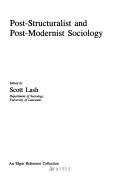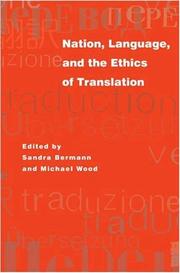| Listing 1 - 5 of 5 |
Sort by
|

ISBN: 0415606888 1315015919 1136492003 9781136492006 9781315015910 0415291259 9780415291255 9781136492143 1136492143 9781136492075 1136492070 9780415606882 Year: 2003 Publisher: Abingdon, Oxon : Routledge,
Abstract | Keywords | Export | Availability | Bookmark
 Loading...
Loading...Choose an application
- Reference Manager
- EndNote
- RefWorks (Direct export to RefWorks)
First Published in 2002. Routledge is an imprint of Taylor & Francis, an informa company.
Structuralism --- Poststructuralism. --- Post-structuralism --- Philosophy, Modern --- Structure (Philosophy) --- Philosophy --- Whole and parts (Philosophy) --- Form (Philosophy) --- Poststructuralism --- History.
Book
ISBN: 3476015076 9783476015075 Year: 1997 Volume: 18 Publisher: Stuttgart Metzler
Abstract | Keywords | Export | Availability | Bookmark
 Loading...
Loading...Choose an application
- Reference Manager
- EndNote
- RefWorks (Direct export to RefWorks)
Literature --- anno 1900-1999 --- German literature --- Literature, Modern --- Poststructuralism --- Structuralism (Literary analysis) --- History and criticism --- Congresses --- 82.015.9 --- -Literature, Modern --- -Poststructuralism --- -Structuralism (Literary analysis) --- -Criticism --- Semiotics --- Post-structuralism --- Philosophy, Modern --- Structuralism --- Modern literature --- Arts, Modern --- Literaire stromingen: postmodernisme --- -Congresses --- -Literaire stromingen: postmodernisme --- 82.015.9 Literaire stromingen: postmodernisme --- -82.015.9 Literaire stromingen: postmodernisme --- -Post-structuralism --- Criticism --- History and criticism&delete& --- German literature - History and criticism - Congresses --- Literature, Modern - History and criticism - Congresses --- Poststructuralism - Congresses --- Structuralism (Literary analysis) - Congresses
Book
ISBN: 9782755506457 2755506458 Year: 2012 Publisher: Paris Mille et une nuits
Abstract | Keywords | Export | Availability | Bookmark
 Loading...
Loading...Choose an application
- Reference Manager
- EndNote
- RefWorks (Direct export to RefWorks)
L'impression que la déraison domine désormais les hommes accable chacun d'entre nous. Que la rationalisation qui caractérise les sociétés industrielles conduise à la régression de la raison (comme bêtise ou comme folie), ce n'est pas une question nouvelle : Theodor Adorno et Max Horkheimer nous en avertissaient déjà en 1944 - au moment où Karl Polanyi publiait La Grande Transformation. Cette question a cependant été abandonnée, tandis qu'au tournant des années 1980, la rationalisation de toute activité, rapportée au seul critère de la " performance ", était systématiquement et aveuglément orchestrée par la " révolution conservatrice " - imposant le règne de la bêtise et de l'incurie. Tout en mettant en évidence les limites de la philosophie qui inspirait l'École de Francfort, le post-structuralisme laisse aujourd'hui ses héritiers désarmés devant ce qui s'impose comme une guerre économique planétaire et extrêmement ravageuse. Naomi Klein a soutenu que la théorie et la pratique ultralibérales inspirées de Milton Friedman reposaient sur une " stratégie du choc ".L'" état de choc " permanent règne cependant depuis le début de la révolution industrielle - et plus encore depuis le temps où s'applique ce que Joseph Schumpeter décrivit comme une " destruction créatrice ", caractéristique du modèle consumériste. À partir des années 1980, sous l'impulsion de Ronald Reagan et Margaret Thatcher, l'état de choc technologique a été suscité par un marketing planétaire ne rencontrant plus aucune limite, imposant la prolétarisation généralisée, et détruisant l'économie libidinale : ainsi s'est installé le capitalisme pulsionnel où la destruction créatrice est devenue une destruction du monde. L'état de choc est ce que le post-structuralisme n'aura pas pensé, principalement en raison de deux malentendus : 1.quant au sens de la prolétarisation (que Marx pense avant tout comme une perte de savoir induite par un choc machinique), 2. quant à la nature de l'économie libidinale (au sein de laquelle Freud, à partir de 1920, distingue la libido de la pulsion).Bernard Stiegler, philosophe, est notamment l'auteur de La Technique et le Temps, Mécréance et discrédit, Prendre soin. De la jeunesse et des générations et Ce qui fait que la vie vaut la peine d'être vécue.Depuis 2006, il dirige l'Institut de recherche et d'innovation (IRI) et préside l'association Ars Industrialis, Association internationale pour une politique industrielle des technologies de l'esprit.
Economic order --- Political philosophy. Social philosophy --- Philosophie --- Structuralisme --- Poststructuralism --- Education and globalization --- Knowledge, Sociology of --- History --- Globalization and education --- Globalization --- Post-structuralism --- Philosophy, Modern --- Structuralism --- Knowledge, Theory of (Sociology) --- Sociology of knowledge --- Communication --- Knowledge, Theory of --- Public opinion --- Sociology --- Social epistemology --- Post-structuralisme --- Irrationalisme --- Éducation et mondialisation --- Savoir et érudition --- Universités --- Individu et société --- Influence. --- Philosophie. --- Knowledge, Sociology of - History - 21st century

ISBN: 1852781831 9781852781835 Year: 1991 Volume: 9 Publisher: Aldershot Gower
Abstract | Keywords | Export | Availability | Bookmark
 Loading...
Loading...Choose an application
- Reference Manager
- EndNote
- RefWorks (Direct export to RefWorks)
Sociological theories --- Sociology --- Poststructuralism. --- Postmodernism --- Semiotics --- Methodology. --- Social aspects. --- -Semiotics --- -Sociology --- -Poststructuralism --- #SBIB:316.21H00 --- #SBIB:316.21H10 --- Post-structuralism --- Philosophy, Modern --- Structuralism --- Social theory --- Social sciences --- Semeiotics --- Semiology (Linguistics) --- Semantics --- Signs and symbols --- Structuralism (Literary analysis) --- Post-modernism --- Postmodernism (Philosophy) --- Arts, Modern --- Avant-garde (Aesthetics) --- Modernism (Art) --- Post-postmodernism --- Social aspects --- Methodology --- Theoretische sociologie: inleidingen op de huidige toestand --- Het functionalisme en systeemdenken in de theoretische sociologie --- Poststructuralism --- Sociology - Methodology. --- Postmodernism - Social aspects. --- Semiotics - Social aspects.

ISBN: 0691116091 0691116083 9786612505591 1282505599 1400826683 9780691116099 9780691116082 9781400826681 Year: 2005 Volume: *1 Publisher: Princeton, N.J. Princeton University Press
Abstract | Keywords | Export | Availability | Bookmark
 Loading...
Loading...Choose an application
- Reference Manager
- EndNote
- RefWorks (Direct export to RefWorks)
In recent years, scholarship on translation has moved well beyond the technicalities of converting one language into another and beyond conventional translation theory. With new technologies blurring distinctions between "the original" and its reproductions, and with globalization redefining national and cultural boundaries, "translation" is now emerging as a reformulated subject of lively, interdisciplinary debate. Nation, Language, and the Ethics of Translation enters the heart of this debate. It covers an exceptional range of topics, from simultaneous translation to legal theory, from the language of exile to the language of new nations, from the press to the cinema; and cultures and languages from contemporary Bengal to ancient Japan, from translations of Homer to the work of Don DeLillo. All twenty-two essays, by leading voices including Gayatri Spivak and the late Edward Said, are provocative and persuasive. The book's four sections--"Translation as Medium and across Media," "The Ethics of Translation," "Translation and Difference," and "Beyond the Nation"--together provide a comprehensive view of current thinking on nationality and translation, one that will be widely consulted for years to come. The contributors are Jonathan E. Abel, Emily Apter, Sandra Bermann, Vilashini Cooppan, Stanley Corngold, David Damrosch, Robert Eaglestone, Stathis Gourgouris, Pierre Legrand, Jacques Lezra, Françoise Lionnet, Sylvia Molloy, Yopie Prins, Edward Said, Azade Seyhan, Gayatri Chakravorty Spivak, Henry Staten, Lawrence Venuti, Lynn Visson, Gauri Viswanathan, Samuel Weber, and Michael Wood.
Translating and interpreting --- Translating and interpreting. --- Vertalen en culturele identiteit. --- Vertalen en cultuur. --- Vertalen en ethiek. --- Vertalen en interculturele communicatie. --- Interpretation and translation --- Interpreting and translating --- Interprétariat --- Interprétation (Traduction) --- Language and languages -- Translating --- Literature -- Translating --- Traduction -- Technique --- Traduction et interprétation --- Traduction orale --- Traduction écrite --- Traductologie --- Translation and interpretation --- Vertaling en interpretatie --- Theory of literary translation --- Translation science --- #KVHA:Ethiek; vertaalwetenschap --- 82.035 --- 418.02 --- Language and languages --- Literature --- 82.035 Literatuur. Algemene literatuurwetenschap--?.035 --- Literatuur. Algemene literatuurwetenschap--?.035 --- Translating --- Translators --- Allegory. --- Allusion. --- Alterity. --- Analogy. --- Author. --- Awareness. --- Censorship. --- Colonialism. --- Comparative literature. --- Cosmopolitanism. --- Criticism. --- Critique. --- Cultural studies. --- Cultural translation. --- Dialectic. --- Dictionary of the Khazars. --- Edward Said. --- Essay. --- Ethnocentrism. --- Eurocentrism. --- Exclusion. --- Foreign language. --- Gayatri Chakravorty Spivak. --- Genre. --- Grammar. --- Hexameter. --- Ideology. --- Imperialism. --- Jacques Derrida. --- Jews. --- Khazars. --- King Lear. --- Language interpretation. --- Latin America. --- Lawrence Venuti. --- Lecture. --- Legal culture. --- Literary criticism. --- Literary theory. --- Literature. --- Magic realism. --- Metonymy. --- Modernity. --- Mr. --- Nadine Gordimer. --- Narrative. --- Nation state. --- National identity. --- National language. --- Negotiation. --- Neologism. --- New Nation (United States). --- Of Education. --- Originality. --- Pamphlet. --- Pedagogy. --- Persecution. --- Philosopher. --- Philosophy. --- Photography. --- Phrase. --- Plagiarism. --- Poetry. --- Politics. --- Post-structuralism. --- Postcolonialism. --- Postmodernism. --- Preface. --- Prejudice. --- Princeton University Press. --- Prose. --- Psychoanalysis. --- Public sphere. --- Publication. --- Rabindranath Tagore. --- Racism. --- Religion. --- Rhetoric. --- Romanticism. --- Routledge. --- Salman Rushdie. --- Subjectivity. --- Suffering. --- Suggestion. --- Synecdoche. --- The Other Hand. --- The Various. --- Theodor W. Adorno. --- Theory. --- Thought. --- Translation studies. --- Translation. --- Understanding. --- Untranslatability. --- Vocabulary. --- Walter Benjamin. --- Western world. --- World literature. --- Writer. --- Writing.
| Listing 1 - 5 of 5 |
Sort by
|

 Search
Search Feedback
Feedback About UniCat
About UniCat  Help
Help News
News